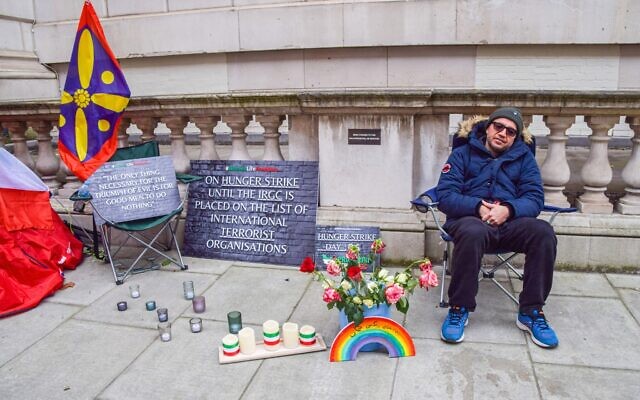‘We’re seeing the end of the Iranian regime. Expect the final chapter’
British-Iranian hunger striker Vahid Beheshti delivers a message of hope on the 166th day of his sit-in protest outside the Foreign Office in Whitehall.
Jenni Frazer is a freelance journalist

One of the most vehement critics of the Iranian regime, Vahid Beheshti, says he believes “we are seeing the imminent end of the regime. At any moment, we can expect the final game”.
And the British-Iranian national, speaking on the 166th day of his sit-in protest outside the Foreign Office in Whitehall, told Jewish News that “our best friends [in the fight against the Iranian regime] are the Jewish community and Israel. We have the same enemy”.
Earlier in the year the Coventry-based campaigner spent 72 days on hunger strike outside the Foreign Office, ending up in hospital.
He took the drastic decision to go without food in pursuit of a single goal — to have the terrifying Islamic Revolutionary Guards Corps (IRGC) proscribed by the British government.
Reports over the weekend quoted Home Secretary Suella Braverman as saying that Iran represented “one of the biggest threats to UK national security”. She was expressing concern after the Sunday Times reported that Iranian intelligence agents were recruiting members of criminal gangs to take out regime opponents.
But Vahid Beheshti, speaking to Jewish News from his protest encampment opposite the Foreign Office, said that Britain had come tantalisingly close to proscribing the IRGC in January, only to abandon the plan on what he believed to be the advice of the Foreign Office.
Now the campaigner, 46, has learned that a fatwa has been issued against him by Iranian regime leaders. But he refuses to give up “until Britain stops its policy of appeasement and proscribes the IRGC”.
Born and brought up in Borujerd, a city 400 kilometres south-west of Tehran, Beheshti describes himself as an activist against the regime from an early age.

He paints a picture of an argumentative and rebellious boy, repeatedly challenging religious teachers in school. Smiling, he recalled how, aged 13, he once persuaded all the young people living in his cul-de-sac street to join him in night-time daubing of anti-regime slogans on walls all over the city. “I was caught by my dad. He beat me…but he knew that if I got caught by someone else, the whole family would suffer. But I couldn’t stay quiet”.
By his late teens he had been arrested twice “for conflicting with decisions in the city” and it became clear that he needed to leave the country.
Aged 21, Beheshti arrived in Britain and for the first few years, he says, “I decided to stay quiet. But it didn’t last”.
By 2009, the rise of the so-called Green Movement in Iran, protesting against the regime, drove Beheshti back to activism. Soon he was leading demonstrations and writing and performing street theatre. He also began going to the European Parliament on a regular basis and providing evidence of Iranian human rights violations to MEPs.
Now the campaigner, 46, has learned that a fatwa has been issued against him by Iranian regime leaders. But he refuses to give up “until Britain stops its policy of appeasement and proscribes the IRGC
By the middle of the decade he was working in journalism, relying on information from regime opponents inside Iran to bolster his reports outside the country.
But it was the advent of the striking “Women, Life, Freedom” protest movement inside Iran in autumn 2022 which raised Beheshti’s activism to another level. “We decided to focus on the threat of the IRGC, particularly to campaigners outside Iran. We believe that in the past 44 years there have been at least 545 assassinations carried out by IRGC agents outside Iran”.
After two conferences in Parliament, in which Beheshti spelled out the danger of the IRGC, “we thought we were very close to proscription taking place. Suddenly we found there was an obstacle. And we knew that we had cross-party support in both houses of parliament. Then we found out that the Foreign Office was holding the government back”.
No-one from the Foreign Office communicated with Beheshti and his group. “That was the moment that I thought that conversations, meetings, conferences were not working. I felt I had to do something more than this.”
The precise trigger for his hunger strike, he says, was a phone conversation his wife, Matty Heaven, was having with a journalist from Iran International TV, which regularly reported on human rights violations by the regime. “While my wife was on the phone to this journalist, she [the journalist] was attacked.” Convinced that the attack had been carried out by IRGC agents, Beheshti launched his radical action.
Twenty-six days into his hunger strike Alicia Kearns MP, chair of the foreign affairs select committee, told Beheshti that the lack of proscription was being blamed on the Americans — that the Biden administration had asked Britain to hold off because they were in the middle of delicate hostage exchange.
The Foreign Secretary [James Cleverley] has recently announced plans for a new sanctions regime which gives the UK new powers to target Iranian decision makers and those doing their bidding.
A furious Beheshti maintains that hostage-taking is precisely the policy underpinning every action of the Iranian regime, as a way of manipulating foreign governments. Now, however, he says America has backed off from this “excuse”, and that Britain says its priority is “the safety and security of British nationals” — the reason it gives for not proscribing the IRGC.
A UK government spokesperson said: “We will continue to take strong action against Iran while they threaten people in the UK and around the world. The UK has sanctioned more than 350 Iranian individuals and entities, including the Islamic Revolutionary Guards Corps in its entirety.
“The Foreign Secretary [James Cleverley] has recently announced plans for a new sanctions regime which gives the UK new powers to target Iranian decision makers and those doing their bidding.”
Now facing a fatwa from the Iranian regime, Vahid Beheshti does not rule out resuming a hunger strike and says “that’s the price to pay — it’s my choice. They [the regime] took everything from me, even my most basic human rights”. And in an appeal to James Cleverley, he said: “History will be written about Mr Cleverley and the choices he makes, if he continues to appease terrorists”.
Describing Iran as not merely the funder of Hamas and Hizbollah, but their founder, Beheshti was nonetheless optimistic that these were the dying days of the ayatollahs ruling Iran. The “Women, Life, Freedom” campaign was proving impossible to stamp out and more and more women were appearing in Iranian streets without head and face coverings.
“But Iran remains the godfather of terrorist organisations and the first step [to unravelling its power] is for Britain to proscribe the IRGC, in the same way as it did with Hamas and Hizbollah”.

Thank you for helping to make Jewish News the leading source of news and opinion for the UK Jewish community. Today we're asking for your invaluable help to continue putting our community first in everything we do.
For as little as £5 a month you can help sustain the vital work we do in celebrating and standing up for Jewish life in Britain.
Jewish News holds our community together and keeps us connected. Like a synagogue, it’s where people turn to feel part of something bigger. It also proudly shows the rest of Britain the vibrancy and rich culture of modern Jewish life.
You can make a quick and easy one-off or monthly contribution of £5, £10, £20 or any other sum you’re comfortable with.
100% of your donation will help us continue celebrating our community, in all its dynamic diversity...
Engaging
Being a community platform means so much more than producing a newspaper and website. One of our proudest roles is media partnering with our invaluable charities to amplify the outstanding work they do to help us all.
Celebrating
There’s no shortage of oys in the world but Jewish News takes every opportunity to celebrate the joys too, through projects like Night of Heroes, 40 Under 40 and other compelling countdowns that make the community kvell with pride.
Pioneering
In the first collaboration between media outlets from different faiths, Jewish News worked with British Muslim TV and Church Times to produce a list of young activists leading the way on interfaith understanding.
Campaigning
Royal Mail issued a stamp honouring Holocaust hero Sir Nicholas Winton after a Jewish News campaign attracted more than 100,000 backers. Jewish Newsalso produces special editions of the paper highlighting pressing issues including mental health and Holocaust remembrance.
Easy access
In an age when news is readily accessible, Jewish News provides high-quality content free online and offline, removing any financial barriers to connecting people.
Voice of our community to wider society
The Jewish News team regularly appears on TV, radio and on the pages of the national press to comment on stories about the Jewish community. Easy access to the paper on the streets of London also means Jewish News provides an invaluable window into the community for the country at large.
We hope you agree all this is worth preserving.





















